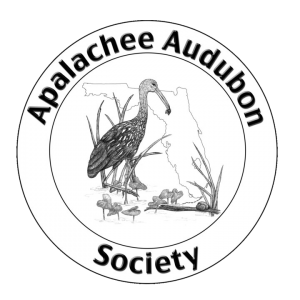By Ben Rangel
The 2019 Florida Audubon Assembly was held October 24--26 in Gainesville, and this year Apalachee Audubon board members Kathleen Carr, Donna Legare, Ben Rangel, along with our President, Peter Kleinhenz, and one of our Lake Elberta Project interns, Nelson Ball, were in attendance. Our board representatives came away from the Assembly inspired by a weekend of networking, learning sessions, award ceremonies, and, of course, birding.
The theme of this year’s assembly was “Water and Land for Florida’s Future: Science-based Strategies for Clean Water and Healthy Watersheds” and the events of the weekend mirrored this important topic. The Friday morning birding field trips were located near water: Kathleen and Ben visited Bolen Bluff, an oak hammock on the south side of the Paynes Prairie’s Alachua Lake; Donna and Nelson birded at La Chua Trail, located on a boardwalk along a flooded sinkhole; and Peter went to Sweetwater Wetlands, which is Gainesville’s waste water treatment wetland. Those that visited Bolen Bluff saw a yellow-billed cuckoo, a barred owl, a white-eyed vireo, and many types of warblers, including black-and-white, hooded, and many American redstarts. At La Chua, Donna and Nelson also saw a yellow-billed cuckoo, many limpkins, various warblers, a bald eagle, and several snail kites. Peter saw over ten limpkins, six snail kites, and two American bitterns. These birding hotspots allowed our members to see several “lifers”, but also offered up various birds of the typical fare.
The birding field trips were followed by a series of learning sessions related to the Assembly’s theme. Our members chose to attend two different sessions: one entitled “Treatment Wetlands: Bird Habitat that Improves Water Quality”, and another called “Trees, Cows, and Wetlands: The Role of Agriculture in Florida’s Watersheds”. At the “Treatment Wetlands” session, attendees learned about the role of places like Sweetwater, where municipalities have chosen to treat their wastewater through the “green infrastructure” of human-designed wetlands, which also offer the benefits of wildlife habitats, public recreation, and educational opportunities. The “Trees, Cows, and Wetlands” learning session gave an eye-opening look at how agriculture affects Florida watersheds, and the current issues of preventing agricultural lands from turning into urban development, eco-friendlier agriculture technologies, and working with farmers, ranchers and timber companies to increase conservations easements.
Throughout these events, Nelson, Donna and Peter also participated in the Assembly’s Conservation Leadership Initiative. The CLI brings together Audubon leaders working within conservation-minded fields with some of the best college students in the state in a mentorship opportunity. Donna and Peter participated as mentors, and Nelson was selected as a scholarship recipient in this highly competitive program. Nelson’s acceptance into the program shows that our chapter has done an excellent job of selecting interns who will go on to be leaders in conservation fields.
At the Friday evening banquet, there were many significant awards given out to individuals and organizations across the state who have gone above and beyond to protect Florida’s environment. Attendees also heard from the first Chief Science Officer of the State of Florida, Dr. Thomas Frazer, and his work with the Governor and the Department of Environmental Protection to use sound science for protecting and improving the state’s water quality and environment.
The highlight of the weekend for our chapter occurred during the Saturday morning Chapters’ Celebration. Apalachee Audubon was named Chapter of the Year, and our attending members were honored to stand on stage in front of representatives of chapters across the state to express our gratitude to all the members, donors, leadership, and volunteers who have made our chapter so great. After our representatives accepted the award, Jacqui Sulek, Chapter Conservation Manager for Florida Audubon, made a point to emphasize the great work that has been done with our Lake Elberta Project, and that we had found such strong leadership in our President, Peter Kleinhenz.
We would not have been named Chapter of the Year were it not for our membership and their generous donations which support the projects our chapter undertakes. We continue to need your support. The Lake Elberta Project is reaching a critical point where native plants are attracting large amounts of pollinators and birds. We need funding for the next few seasons to increase our planting areas. It’s not hard to imagine the lake being surrounded by native plants and devoid of invasives, and becoming the number one birding spot in Leon County. Also, the chapter made the decision to pay our interns, as they do a huge amount of work planning events, meeting with the city, advertising our chapter, and preparing to become future leaders of our organization. Past donors have earmarked donations to be used to support the interns or buy plants for Lake Elberta.
To make a donation directly to our chapter, please visit the “Get Involved” tab on our website at https://www.apalachee.org/




